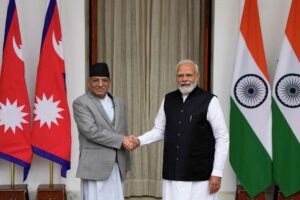
“Anti-occupation” law in Chile
Road blocked by protest against the “anti-occupation” law and the increase of the living cost. Source: Newspaper El Pueblo
In 2021 the preliminary draft of the “anti-occupation” law was carried out, which aims to change the typification of land occupations in Chile, changing from administrative fines to penalties of up to five years of imprisonment. This law is being debated in the parliament after the senate approved it on 9th May. A press conference was published in the newspaper El Pueblo and a radio program on Radio Miño on how the “anti-occupation” law affects the people.
The living cost in Chile is increasing with the global crisis. In just one year the price of living has increased by 28%, especially for basic products such as food, water, electricity and rent. In addition, one of the most important historical demands of the Mapuche people has been the return of their land, usurped by the big landowners. That is why in past years the land occupation have acquired an important character in the struggle of the Chilean people. Faced with this, the politicians have taken out a draft law, popularly known as the “anti-occupation” law, in order to stop the land and rent struggle.
Currently, the occupation of land or houses is punished with fines, both violent and non-violent occupation. With the proposed law, it would no longer be an economic sanction, but a crime with prison sentences. For example, in the case of a non-violent occupation, the penalty would vary from 61 days to 3 years in prison. In the case of occupation “with violence”, which are those that include not only intimidation or violence, but also damage to fences or doors, the penalty would range from 541 days to a maximum of 5 years imprisonment. In addition, the law contemplates multiple aggravating circumstances: for example, if the occupation of land or house is carried out by a family with minors between 14 and 16 years of age, in any case, the mandatory the maximum penalty would be imposed in any case. If the occupation takes place in buildings intended for “fire prevention properties”, the maximum penalty will be applied. These buildings referred to in the law include the buildings of the Forestry Brigades, which are normally located on usurped Mapuche lands. The penalties cannot be reduced even if there are mitigating factors, which contradicts Chilean law itself, but which has also been used in crimes such as armed robbery, comparing crimes against physical integrity with those related to private property.
There are more changes at the repressive level, especially regarding arrests. With the current law, it is not possible to arrest the people who have carried out the occupations; however, with the draft law, the carabineros [author’s note: military police from Chile] can arrest any person involved without a judge’s order. Also, if the occupation is carried out by an “unlawful” organization – a very broad term that is not defined – they have permission to tap the organization’s phones. In addition, there was a previous ruling of the Supreme Court that specified that if 12 hours had passed since the occupation, the property could not be vacated urgently, but had to be ordered by the judge. Now it is intended that it will always be a “flagrant” crime and therefore, no matter how much time has passed, it will always be possible to evict the property without a judge’s order.
The landowners, with large interests in the south of Chile, where much of the usurped Mapuche lands are located, will also be able to defend their properties themselves or their relatives. They will be able to defend themselves with “anything”, including firearms, against an “invasion of their property”, supposedly in a “proportional” manner, but nothing else is defined. In addition, they have given greater guarantees to recover their property, even being able to turn down the house if the judge sees convenient in order to recover the land, in addition to the eviction itself.
This law, although it would mainly affect those who take land and homes, can also affect those who take property temporarily. For example, in the student struggle of 2019, there were takeovers of universities and public buildings that were taken as a measure of pressure of the struggle that was being carried out. Under this law, these same measures could also be applied, so with similar protests the government would also be trying to limit the forms of struggle increasing repression. The same applies to workers who may take over a factory during a strike, also as a means of pressure on the company.
In front of this situation there has been protests in the street by different collectives. For example on 31st May the Gathering for house Stragglers of Lo Hermida took a rally against the price increasing and the “anti-occupation” law.


